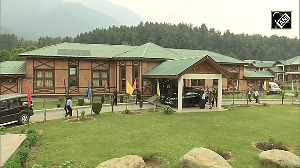 Better relations with India will be a minefield for the newly-elected Pakistan government, says B Raman
Better relations with India will be a minefield for the newly-elected Pakistan government, says B Raman
There is a need to restrain euphoric expectations -- from the positive statements on relations with India -- made by some mainstream Pakistani political leaders such as former prime minister and leader of Pakistan Muslim League Nawaz Sharif.
Sharif, in particular, has gone out of his way in befriending Indian journalists covering the Pakistani election campaign. He has expressed his intention about improving the relationship with India and holding an enquiry into the Kargil military conflict of 1999, which, according to him, was initiated by General Pervez Musharraf, the then chief of the army staff, without his knowledge.
Such statements have created unwarranted expectations of better India-Pakistan relations in sections of the Indian media.
The assessment in media circles in Pakistan is that the PML-N may emerge as the largest single party in the elections, followed by Imran Khan’s Pakistan Tehrik-e-Insaaf and the united front of the Pakistan People’s Party, the Mohajir Qaumi Movement and the Awami National Party, which have been viewed by the Tehrik-e-Taliban Pakistan as liberal parties and have been the targets of violent attacks by the TTP to disrupt their poll prospects.
Whoever comes out on top in the elections, the period after the elections will see competitive attempts to form a new coalition to rule the country. During the period of the coalition formation, foreign policy, except the policy towards the Afghan Taliban and opposition to the United States war on global terrorism, particularly the use of the drone strikes by the US against targets in Pakistani territory, is expected to occupy a low priority.
Better relations with India will be a minefield. The sensitivities of the army and the fundamentalist and jihadi organisations may have to be taken into consideration by the mainstream parties before they take any major initiative for policy change in a positive direction. They have to go very slow and contain their enthusiasm. Better relations with India are, therefore, unlikely to be for tomorrow unless the PML-N comes out with an absolute majority of its own.
India’s immediate policy interest should not focus on a quick improvement in the bilateral relations but in the prospect for better internal stability and security in Pakistan, with genuine control over the activities of the TTP, the Lashkar-e-Tayiba, the Lashkar-e-Jhangvi and other jihadi organisations.
India has had a contentious relationship with Pakistan ever since the two countries became independent in 1947.
If this contentious relationship continues for some more years, we can live with it, provided the new ruling dispensation in Pakistan shows the courage and foresight to take on the fundamentalist and jihadi organisations, defeat them in the interest of the people of Pakistan and at the same time persuade the army to co-operate with the civilian leadership in this direction.
If and when fundamentalist and jihadi organisations are removed from the scene, the obstacles in the way of better ties with India will get gradually diluted.











